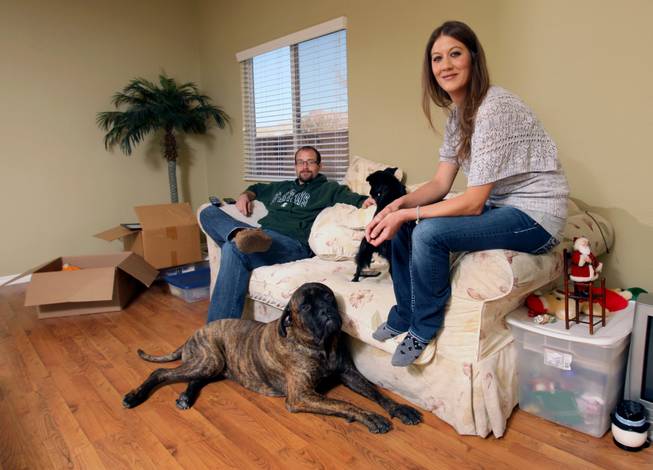
Jody, left, and Taya Compeau are shown in the living room of their new home Sunday, Dec. 4, 2011. With the couple are their dogs Dozer, a 2-year-old Bullmastiff, and Nina, a 1-year-old Chihuahua-Pomeranian mix.
Tuesday, Dec. 6, 2011 | 2 a.m.
Related
The worst housing market in 70 years has created a recession-flavored version of the American dream for first-time home buyers in Las Vegas.
Attracted by home prices that have plummeted to a fraction of what they were during the peak of the housing boom in Las Vegas, new buyers have helped drive the healthiest home resale market in Southern Nevada since the bubble popped. Economic pain for sellers is translating to hope and opportunity for people shopping for their first home.
Along with investors and others seeking real estate bargains, first-timers spurred sales of 40,033 existing homes in the Las Vegas Valley from January to October — the highest figure since a record 50,009 resales during the first 10 months of 2005. The median price of an existing home was $110,000 last month, almost a third of what it was at the height of the bubble.
“In terms of the numbers, it’s a fantastic year for resales. Think of how many sales we’d have if it wasn’t like that,” said Homebuilders Research President Dennis Smith. “Why is demand there? Look at the prices. So long as we have these low prices, we’re going to have demand. We’ve got plenty of investors. Vegas is not dead and blowing away.”
Although prices have plummeted, getting into the market isn’t always easy. Among homebuyers seeking to tap into bargain-priced properties with conventional mortgages rather than the 50 percent down, cash approach of investors, a significant number bemoan a climate of lender delays, miscommunication and reluctant appraisers who are skittish about doing their jobs amid the price plunge and the uncertainty it has spawned.
Cost-conscious banks are understaffed and often unable to handle the volume of mortgage applications, Smith says, adding that many bank employees lack the training to handle the complexities of short sales, in which homes sell for less than the mortgages that were obtained to purchase them. He says home appraisers are low-balling their appraisals as they struggle to assess the value of so many homes.
“The banks and appraisers are covering their behinds, and the pendulum has swung way past what would make the most sense,” he said.
So what’s the environment like for first-time buyers? Here, some of the newest homeowners in Southern Nevada share their stories:
Taya and Jody Compeau
The Compeaus had multiple deals of the verge of closing, so close that Jody, Taya and their two young boys were prepared to move into their new home. But then the purchases fell through, derailed by bank financing that never came through. Loan processors needed more paperwork, paycheck stubs, records of tax filings. The process took so long that multiple 30-year fixed loans fizzled.
“They told us we had everything, and then we didn’t,” Taya Compeau said, frustration readily evident in her voice. “It felt like we were just getting the runaround.”
She’s a food server at the Golden Nugget, and tips make up a significant portion of her annual earnings, complicating the paperwork process as lenders attempted to gauge her yearly pay. You might assume that mortgage lenders would be accustomed to working with tip earners, who make up a large portion of Southern Nevada’s working population, but that wasn’t the case for her.
“We put in for several different houses and we didn’t get a loan. My husband wanted to give up after the second month,” she said of the couple’s nearly nine-month financial adventure. “The problem with these lenders is they don’t look at everything. They say you’re approved when you’re not. Then it falls through, and you have to start over.”
Jody is a manager and driver for PODS moving storage. The couple’s joint monthly pre-tax income is $6,500, enough to qualify them for a loan to pay $161,500 for a 2,600-square-foot home in northwest Las Vegas. The previous owners paid $400,000 for the home six years ago but lost it to foreclosure earlier this year, according to the Clark County assessor’s website. It’s a classic Las Vegas Valley tale in the midst of the Great Recession: One couple’s loss is another’s very affordable opportunity.
The Compeaus, both in their early 30s, finally closed the sale on Nov. 9.
It’s been a revelation: the sense of homeownership, the comfort of sending their kids to newer elementary and middle schools, no longer having to pay rent.
“It makes me sick to think how much we threw money away toward rent,” Taya Compeau said. “This is a lot nicer neighborhood than what we were in, and I’m happy we found this area in the valley to move to.”
She doesn’t hesitate when asked what advice she’d give potential homebuyers: “It is not a quick process. You have to be patient — very, very patient. If it doesn’t happen the first time, get out there and keep trying.”
Allison Cordova
While others are out partying, running up big bar tabs at local clubs, Cordova, 26, is focused on saving her money and planning for the future. Her background working with Nevada Hand Inc., a nonprofit developer of affordable housing, has made Cordova especially sensitive to the challenges of purchasing a home in a housing market that finds investors dropping 50 percent cash down payments to snatch up houses at bargain-basement prices.
She has run the group’s Neighborhood Stabilization Program, which links low-income individuals with federal dollars that help them purchase previously foreclosed homes. She understand the complexities of today’s housing market.
“Being in the shoes of a buyer, it’s still very daunting and overwhelming,” she said. “It’s such a huge step buying a house, given the current state of the economy and the market, it took a lot of thought on my part. You wonder, do I really want to make that investment? Is it the right time or not to buy?”
Cordova worked with a Realtor to find a 1,780-square-foot Las Vegas home in foreclosure, one that was held by Fannie Mae. Her annual income is in the mid-$40,000 range. She’s single with some college and credit card debt and a car loan on a year-old Mazda SUV. Her FICO, that vital measure of an individual’s credit rating, is in the mid-700s, a particularly good score on a scale that tops out at 850, and she bought a home for $163,500 with a 30-year fixed loan from a small private lender rather than one of the major banks. Her monthly payment: $964.
“I don’t want to bad-mouth them, but in my eyes because they’re such institutions, there’s miscommunication (with banks),” said the University of San Diego journalism graduate. “The underwriter might be here and the loan officer might be in another state. You’re having to resend documents. There are underwriting problems, delays and quality-control issues — where are the files? Just a lot of delays, a lot of miscommunication. They’re not very responsive and as a buyer you always have to be following up with them. You have to be an assertive buyer and know what you’re getting yourself into.”
Cordova offers advice for someone considering whether to purchase a home: “If you have some money saved up and if you are looking to make an investment in this town, I think it’s work looking into. It’s not a bad time to buy. There’s a lot of inventory out there. There are options out there. Go the extra mile and do a little research.”
Sarah and Richard Sturman
The Sturmans were tantalizingly close to buying a two-story, five-bedroom, 3.5-bathroom house with an asking price of $220,000, a virtual steal when you consider that similar-size 3,000-square-foot homes were going for nearly triple that amount five years ago. In foreclosure for more than a year, the home had first and second mortgages, and the lender on the first had signed off on the couple’s offer, but the holders of the second note turned it down and refused to budge. They wanted more money.
The Sturmans and the lenders went back and forth trying to reach an agreement, but the second lender declined their offers. The delays forced them to go through underwriting three times. Their lender was slow about getting back to them, and the process dragged. “It was really horrible because you’ve got your hopes up,” Sarah recalled. “We lived near the house in an apartment. We would watch it, then found out the bank wasn’t getting enough money and we were going to lose out on the dream. After seven months we just gave up because we knew it wasn’t going to work out.”
They made offers on other homes but lost out on three other short sales, the purchasers getting the homes for just a few thousand dollars more. Frustrated, the Sturmans decided to save more money so they’d have a larger down payment than the $11,000 they had in the bank, but they gave it one more shot and turned to another foreclosed home in their desired neighborhood near Durango Drive and El Capitan Way. It’s dotted with distressed homes, a virtual shopper’s paradise if you can only get the noteholders to sign off on the offers.
Their new target home was slightly smaller than their first, at 2,100 square feet, with four bedrooms, 2.5 bathrooms and an asking price of $209,000.
“This time around, we had better luck,” Sarah Sturman said. “The first time around we were told, ‘It will be another month. It will be another month.’ ”
Now they’re closing on the purchase.
The couple moved to Las Vegas two years ago from suburban Toledo, Ohio. Sarah, 35, is an administrative assistant with Aetna and works from home. Richard, 37, is a radiation technology specialist and works at the Nevada National Security Site. They have a 6-year-old, and like any youngster that age he needs his space, but their apartment is small for a young family.
Their lender arranged a 30-year fixed mortgage, and the couple are paying a monthly mortgage of $1,100, prompting Sarah to ponder what it all means for the Sturmans, the home’s previous buyer and the broader community.
“I feel bad for the people that it happened to,” she said. “I feel bad for the people who had to struggle through it or are struggling through the (housing collapse), but I think we are getting a good bargain.”
She paused for a moment to consider the starts and stops of the nearly yearlong process she and her husband just completed.
“Everyone told us when we moved out to Vegas, ‘Oh, my goodness, you’re going to get a great deal on a home,’ ” Sarah recalled. “That’s well and good if you can get someone to accept your offer.”


Join the Discussion:
Check this out for a full explanation of our conversion to the LiveFyre commenting system and instructions on how to sign up for an account.
Full comments policy